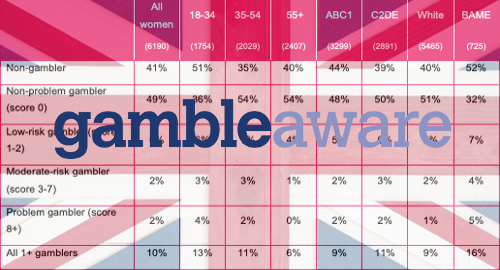 Female problem gamblers in the UK are more likely to be young, working class and from a black, Asian or minority ethnic (BAME) background, according to new research.
Female problem gamblers in the UK are more likely to be young, working class and from a black, Asian or minority ethnic (BAME) background, according to new research.
On Wednesday, the UK’s GambleAware problem gambling charity issued a report it commissioned from survey stars YouGov on “the experiences of women and gambling.” The YouGov survey queried 6,190 women and 5,971 men across the UK over a three-week period last autumn to determine their ranking on the Problem Gambling Severity Index (PGSI).
The PGSI assigns each individual a score, with 0 indicating individuals whose gambling doesn’t present any problems, while those scoring 1-2 are considered at low-risk for gambling problems, 3-7 indicating moderate risk and individuals scoring 8+ experiencing serious gambling problems.
The GambleAware survey found 10% of female participants scored 1+, although just 1.9% scored 8+. Both figures were significantly below male participants, who scored 17% and 3.6%, respectively, in those two categories.
Over half (52%) of women from a BAME background identified as non-gamblers versus 41% of all women in the survey. However, 16% of BAME women scored 1+ on the PGSI versus 10% of all females. Worse, 5% of BAME women scored 8+ versus just 2% of all women.
Looking purely at those who with a PGSI score of 1+, BAME women made up 12% of the total yet claimed a 35% share of those with a PGSI score of 8+. Male gamblers with a BAME background fared only slightly better, accounting for 12% of 1+ scores but 29% of 8+ scores.
Women from lower socio-economic backgrounds were less likely (39%) than those deemed middle-class or higher (44%) to describe themselves as non-gamblers. These lower socio-economic females were also more likely (11%) than their better-off peers (9%) to report an 8+ PGSI score.
Females with a high PGSI score also skewed younger, with those scoring 8+ more likely to be aged 18-34 (13%) than those aged 35-54 (11%) or those aged 55+ (6%).
Around 8% of female participants qualified as ‘affected others,’ meaning someone who has personally experienced negative effects as a result of gambling activity by someone close to them. Here too, women of a BAME background were overrepresented, as 11% of BAME females qualified as ‘affected others’ versus just 8% of white women.
BAME women reported greater willingness to seek out problem gambling treatment programs than their white counterparts, and younger women of all backgrounds were more likely to seek help than older women. However, this was attributed in part to these groups experiencing greater harm and thus greater need for support.
Interestingly, female problem gamblers were far more likely (39%) than males (22%) to cite embarrassment or a desire to keep others from learning of their problems as a deterrent to seeking help.
GambleAware CEO Marc Etches said the survey revealed that women “experience gambling harms in different ways to men and this report is an important first step in understanding those differences.”